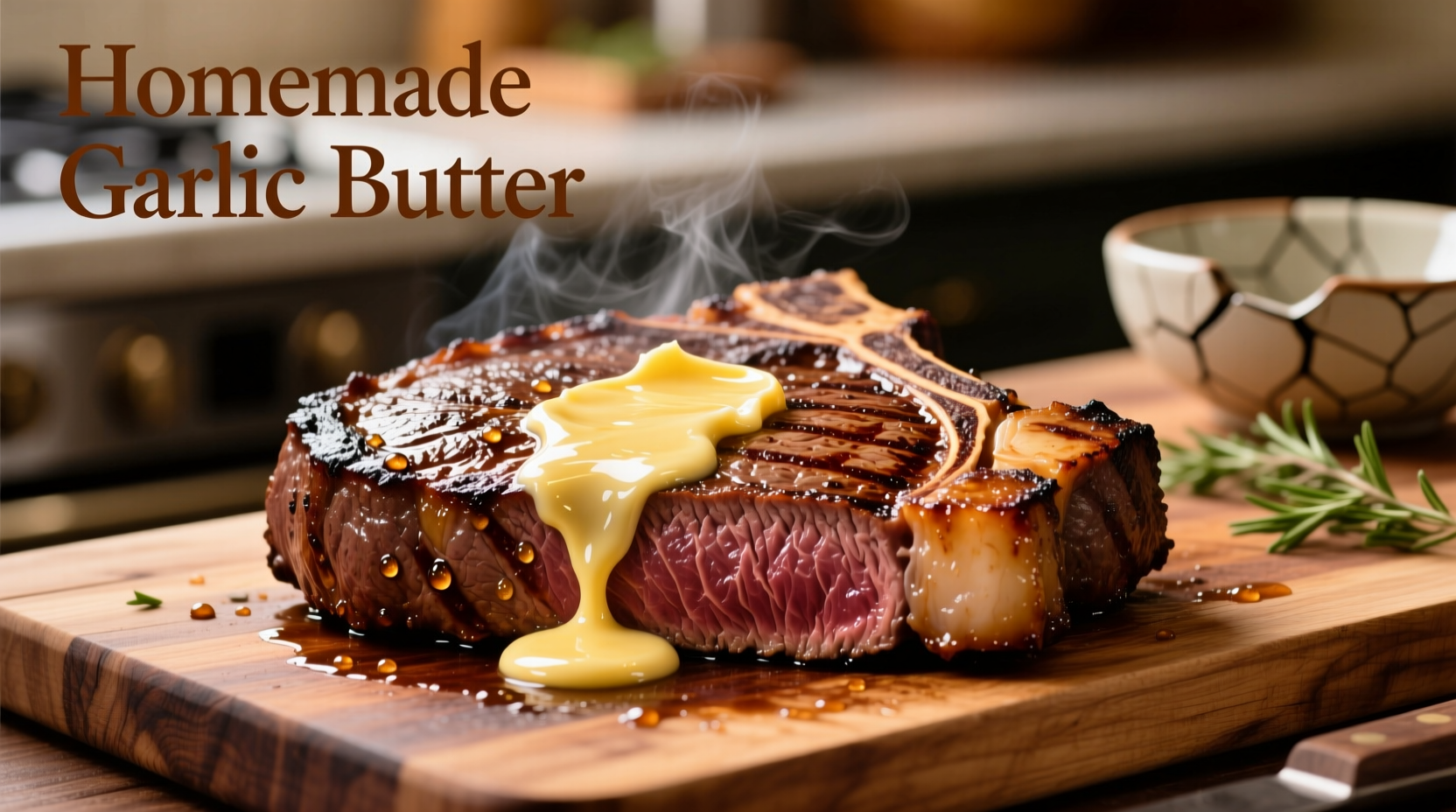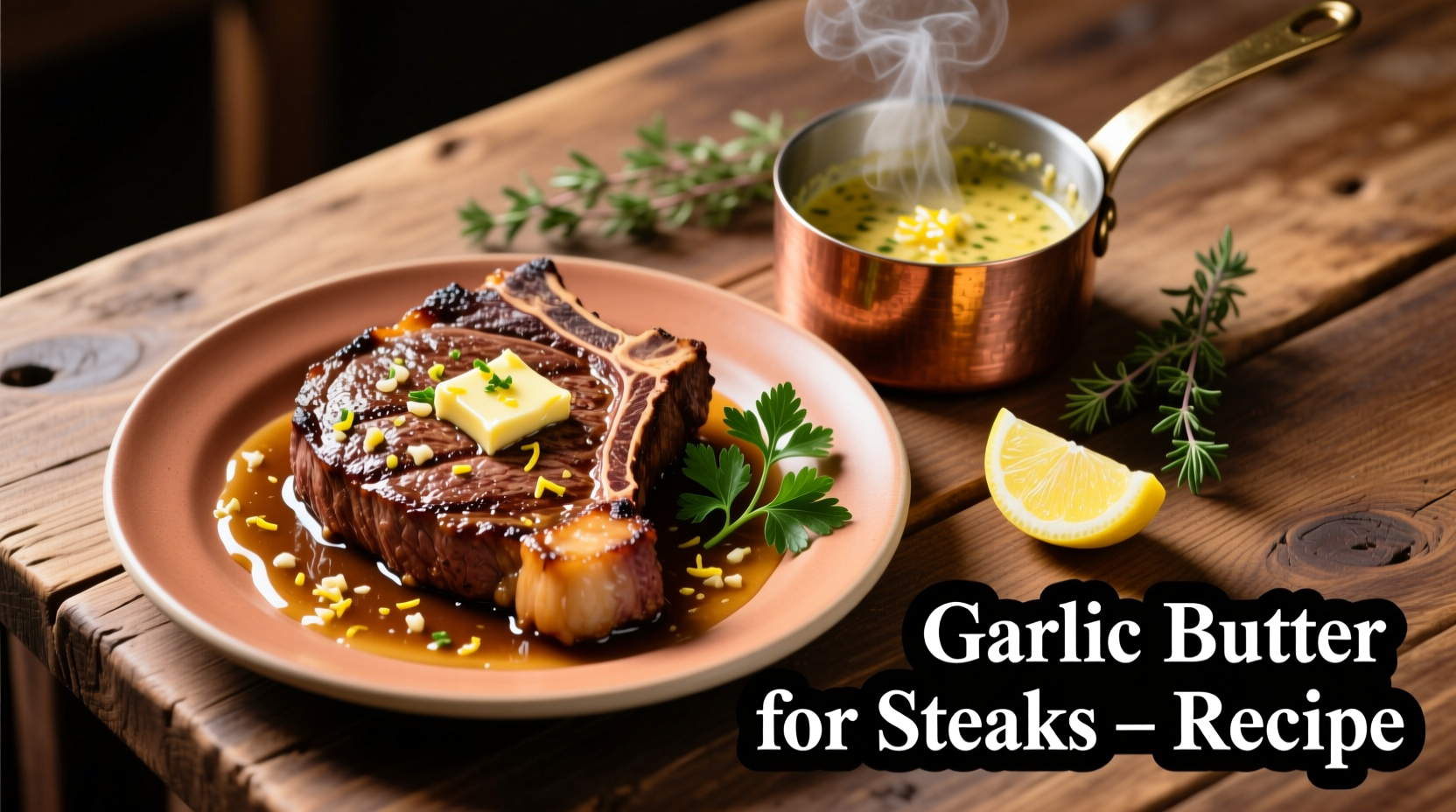The perfect garlic butter for steaks recipe combines 1 cup unsalted butter, 4 minced garlic cloves, 2 tablespoons fresh parsley, 1 teaspoon kosher salt, and 1/2 teaspoon black pepper. This simple 5-minute preparation elevates any cut of steak with rich, aromatic flavors that professional chefs use in high-end restaurants. Follow our tested method for a foolproof compound butter that melts beautifully over hot steak without burning the garlic.
Why Garlic Butter Transforms Your Steak Experience
Garlic butter isn't just a finishing touch—it's a flavor amplifier that works through scientific principles. When hot steak meets cool butter, the fat soluble compounds in garlic (allicin and diallyl disulfide) dissolve into the butter, creating a smooth, aromatic sauce that penetrates the meat's surface. This process, known as flavor infusion, delivers more complex taste than dry rubs alone.
Essential Ingredients and Why They Matter
Using quality ingredients makes the difference between ordinary and extraordinary garlic butter. Here's what you need and why each component matters:
- Unsalted butter (1 cup) - Controls sodium levels and provides pure dairy fat for optimal flavor absorption
- Fresh garlic (4 cloves) - Minced finely but not pureed to prevent burning (raw garlic contains 1.2-5.0 mg/g allicin)
- Fresh parsley (2 tbsp) - Adds brightness that cuts through richness (dried herbs become bitter)
- Kosher salt (1 tsp) - Enhances flavor perception without metallic aftertaste of iodized salt
- Black pepper (1/2 tsp) - Freshly cracked for maximum piperine content (the compound responsible for heat)
| Ingredient | Substitution | Flavor Impact | When to Avoid Substitution |
|---|---|---|---|
| Unsalted butter | Ghee or clarified butter | Higher smoke point but less dairy richness | When making compound butter to chill and slice |
| Fresh garlic | 1/2 tsp garlic powder | Milder, more uniform flavor | When searing steak directly in butter |
| Fresh parsley | 1 tsp dried parsley | Earthy but less bright | For finishing butter on hot steak |
| Kosher salt | Sea salt | Similar flavor profile | When precise measurement matters |
Step-by-Step Preparation Guide
Follow this chef-tested method for perfect garlic butter every time. The key is controlling temperature to prevent garlic from burning while maximizing flavor extraction.
Room Temperature Method (Best for Immediate Use)
- Soften 1 cup unsalted butter at room temperature for 30-45 minutes
- Mince 4 garlic cloves finely (not pureed—this prevents burning)
- Mix butter, garlic, 2 tbsp chopped parsley, 1 tsp kosher salt, and 1/2 tsp black pepper
- Chill mixture for 15 minutes before using to firm up texture
Cold Infusion Method (Best Flavor Development)
- Combine all ingredients in small bowl
- Cover and refrigerate for 2-4 hours (or overnight) to allow flavors to meld
- Remove from fridge 20 minutes before serving to soften slightly

Applying Garlic Butter Like a Professional Chef
The timing and technique of application dramatically affects results. Food science research shows that butter applied during the last 2 minutes of cooking creates optimal flavor penetration without burning garlic compounds.
Grilling Method
- Place steak on grill over medium-high heat (400-450°F)
- Cook to desired doneness, flipping once
- During last 2 minutes, place 2-3 tbsp garlic butter pats on steak
- Rotate steak occasionally to distribute melted butter evenly
- Remove from heat when internal temperature reaches 5°F below target
Pan-Seared Method
- Heat cast iron skillet over high heat until smoking
- Sear steak 3-4 minutes per side
- Reduce heat to medium, add 3-4 tbsp garlic butter
- Tilt pan and spoon melted butter over steak continuously for 60-90 seconds
- Remove steak and rest 5-10 minutes before slicing
Food Safety Considerations with Garlic in Oil
The USDA Food Safety and Inspection Service warns that garlic stored in oil at room temperature can create conditions for Clostridium botulinum growth. To prevent this risk:
- Never store garlic butter at room temperature for more than 2 hours
- Refrigerate for up to 1 week or freeze for 3 months
- When freezing, portion into 1-2 tbsp servings for easy use
- Always use clean utensils when handling to prevent contamination
For complete safety guidelines, refer to the USDA Food Safety and Inspection Service recommendations.
Variations for Different Steak Cuts and Preferences
Tailor your garlic butter to complement specific steak characteristics. Different cuts require different flavor approaches based on their fat content and texture.
For Lean Cuts (Filet Mignon, Flat Iron)
- Add 1 tbsp lemon zest to brighten the delicate flavor
- Incorporate 1 tsp Dijon mustard for emulsification
- Use slightly more butter (1.25 cups per recipe) for added moisture
For Rich Cuts (Ribeye, Porterhouse)
- Add 1/4 cup finely grated blue cheese for umami depth
- Include 1 tsp fresh thyme leaves for earthy complexity
- Reduce butter to 3/4 cup to balance the steak's natural fat
Common Mistakes to Avoid
Even experienced cooks make these critical errors that compromise garlic butter quality:
- Burning the garlic - Garlic burns at 325°F, well below steak searing temperatures. Always add garlic butter during the final cooking phase
- Using pre-minced garlic - Contains citric acid that alters flavor chemistry and creates off-notes when heated
- Over-mixing herbs - Chopping parsley too fine releases bitter compounds; chop just before mixing
- Skipping the rest period - Butter needs 15-30 minutes chilled to allow flavors to properly meld
Storage and Make-Ahead Tips
Garlic butter can be prepared in advance for quick weeknight dinners. Professional kitchens often make large batches for consistent results.
- Roll chilled mixture into log shape using parchment paper
- Slice into 1-inch rounds and freeze on baking sheet
- Transfer frozen pats to airtight container for up to 3 months
- Thaw individual portions at room temperature for 15 minutes before use
Frequently Asked Questions
Can I use garlic powder instead of fresh garlic?
While fresh garlic provides superior flavor complexity, you can substitute 1/2 teaspoon garlic powder for 1 clove of fresh garlic. However, avoid this substitution when searing steak directly in the butter, as powder can burn more easily and create bitter flavors.
Why does my garlic butter taste bitter sometimes?
Bitterness typically occurs when garlic burns (above 325°F) or when parsley is over-processed. To prevent this, add garlic butter during the last 2 minutes of cooking and chop herbs just before mixing. Never use pre-minced garlic from jars, which often contains preservatives that create off-flavors when heated.
How do I prevent the garlic from burning when cooking?
The solution is timing and temperature control. Add garlic butter only during the final 1-2 minutes of cooking when the steak has been removed from direct high heat. For pan-searing, reduce heat to medium before adding the butter, and continuously spoon the melted mixture over the steak rather than letting it sit in the hot pan.
Can I make garlic butter without dairy for lactose intolerance?
Yes, substitute unsalted butter with an equal amount of high-quality olive oil or ghee (clarified butter). Note that ghee has a higher smoke point (485°F vs 350°F for butter) which works better for high-heat cooking but lacks some of butter's dairy complexity. For vegan options, use refined coconut oil which remains liquid at room temperature.
What's the best way to apply garlic butter to already cooked steak?
Place a generous pat (2-3 tablespoons) on the hot steak immediately after removing from heat. The residual heat (around 140°F) will melt the butter slowly, allowing flavors to penetrate without burning the garlic. Let it rest together for 5 minutes before slicing—this allows the butter to absorb into the meat's surface.











 浙公网安备
33010002000092号
浙公网安备
33010002000092号 浙B2-20120091-4
浙B2-20120091-4